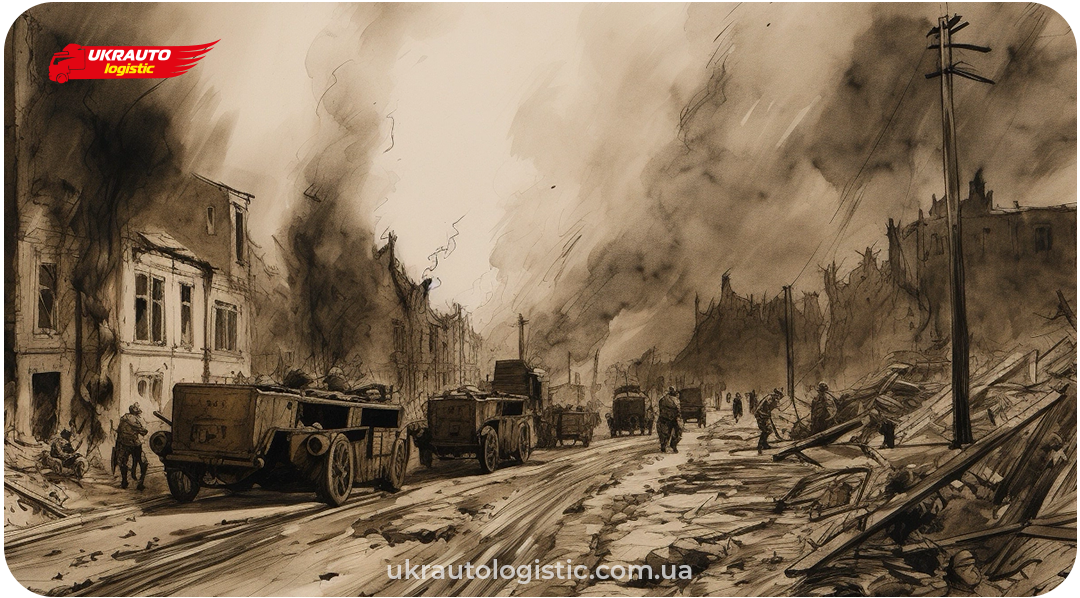Definition of logistics
Logistics – you may have heard this term in conversations about business and supply chains. It is an important component of every successful company, but what exactly does it mean? Let’s take a deeper dive into this concept and explore its many facets.
At its core, logistics is the art and science of managing the flow of goods, energy, information, and other resources from the point of origin to the point of consumption. It is about delivering the right thing, in the right quantity, in the right condition, to the right place and at the right time. The main goal of logistics is to meet customer needs efficiently and effectively.
The importance of logistics
In 2020, the global logistics market was valued at $10.32 trillion and is projected to reach $12.68 trillion by 2027, indicating an annual growth rate of 6.5% between 2021 and 2027.
The analysis of the Ukrainian logistics market also shows a constant growth of 2.67% every year, and most of the cargo is transported by rail (about 52%).
Why is logistics so important? In today’s globalized world, efficient logistics operations are the backbone of any organization. They ensure that a business can source, produce and deliver its products or services to the end customer in a timely and cost-effective manner.
Ready for smooth logistics that will drive your business forward? Contact the «Ukrautologistic» Group team today and let’s transform your logistics operations together!
Why is logistics needed?
At the heart of every business enterprise, every e-commerce transaction, and every consumer purchase is the invisible force that is logistics. It is the pulse that keeps the world of commerce alive and beating, ensuring that every demand is met with supply, every need with a solution, every call with an answer.
Logistics is like an orchestra conductor, coordinating a symphony of goods and services from all corners of the globe to your doorstep. It ensures that coffee beans harvested in a remote village make it to your morning cup, that a smartphone developed around the world is delivered to your hands. Without logistics, the rhythm of our modern life with its ease, speed and convenience would simply cease to exist.
It is a champion behind the scenes, working tirelessly to ensure that the book you’ve been waiting to read, the medical supplies that hospitals desperately need, or an unexpected gift for a loved one arrives at the right place and time. Logistics is a bridge between dreams and reality, aspirations and achievements, making opportunities come to life.
But above all, logistics is about people. It’s about the smile of a child receiving a long-awaited toy, the relief when a patient receives much-needed medication, or the joy of a small business seeing their products reach consumers around the world. In every sense, logistics is truly for us, the people. It is a silent companion that helps us on our journey, making our world smaller, our lives easier, and our dreams come true.
The history of logistics

The concept of logistics, as we know it today, has a rich history dating back centuries. The term “logistics” itself originated in the military sphere, but over time, its application has spread to various industries and sectors. Let’s go through the key stages of logistics as a concept.
Military origins
The roots of logistics can be traced back to ancient times, when military commanders realized the importance of effective supply chain management for their armies. Etymologically, the term “logistics” comes from the Greek word “logistikē”, which meant practical arithmetic related to the calculation of military supplies. In the military context, logistics encompassed the planning, organization and coordination of resources, transportation and maintenance to ensure the smooth functioning of military operations.
The Industrial Revolution and mass production
The Industrial Revolution in the 18th and 19th centuries was an important turning point in the development of logistics. With the development of mass production, factories became centers of productivity. This required efficient movement of raw materials, components, and finished goods to and from production facilities. The emergence of railroads and steamships revolutionized transportation, enabling the expansion of markets and the creation of more extensive supply chains.
The First and Second World Wars
Two world wars played a crucial role in shaping the logistics industry. During the First World War, the scale of mobilization of troops, equipment and supplies on a global scale emphasized the importance of logistics in the conduct of war. This led to the creation of special logistics organizations and the improvement of supply chain processes.

However, logistics really became important during World War II. The large-scale logistics operations required to support the war effort in several theaters demonstrated the strategic importance of logistics. Innovations in transportation, such as the use of convoys and the creation of specialized logistics units, further developed the field.
Post-war development and rise of commercial logistics
After the Second World War, the principles and practices of military logistics began to penetrate the civilian sphere. The complexity of global trade, the development of transportation technologies, and the growth of multinational corporations required effective supply chain management. The concepts of inventory control, warehousing, transportation optimization and information flows have become integral components of commercial logistics.
Technological advances and supply chain integration
The second half of the 20th century witnessed rapid technological advances that further revolutionized logistics. The introduction of computer systems and automation led to significant improvements in inventory management, order processing, and tracking. The emergence of barcode technology and electronic data interchange (EDI) has facilitated the seamless exchange of information between suppliers, manufacturers, and retailers.
In addition, the development of e-commerce and globalization has increased the need for more sophisticated logistics solutions. Supply chain integration has become a top priority, and companies have begun to adopt collaborative approaches to optimize operations, reduce costs, and increase customer satisfaction.
The modern era and beyond
Today, logistics continues to evolve in response to a dynamic global landscape. The growing importance of sustainability, the emergence of artificial intelligence and the Internet of Things (IoT), the development of omnichannel retail, and the growing focus on last-mile delivery are shaping the future of logistics.
Logistics continues to evolve and remains an integral part of modern business operations. Optimizing supply chains, moving goods efficiently and integrating technology are key success factors in an increasingly interconnected and fast-paced world.
Are you ready to take your business to the next level? Turn to the comprehensive logistics services of «Ukrautologistic» Group. With our experience and dedication team, we will optimize your supply chain, increase the efficiency of your business processes and help you cut costs.
Logistics components
If you break down logistics into its components, it consists of three key components: warehousing and storage, transportation, and inventory management.
Warehousing and storage
The role of warehouses in logistics
Warehouses play a crucial role in the logistics process. They provide a centralized location where goods can be received, stored, and distributed to different locations.
Types of warehouses
There are several types of warehouses: distribution centers, refrigerated warehouses for perishable goods, e-commerce fulfillment centers, etc.
Transportation
Different types of transportation
Transportation, the next component, involves moving goods from one place to another. This can be accomplished through various modes of transportation, such as road, rail, sea, and air, depending on the nature and urgency of the goods being transported.
The impact of transportation on logistics
Efficient transportation management is the key to successful logistics operations. It not only affects delivery times and customer satisfaction, but also has a significant impact on the overall cost of logistics.
Inventory management
The importance of inventory management
Inventory management is all about maintaining the right amount of inventory to meet customer needs while minimizing storage costs. This is a delicate balance that can directly affect a company’s financial performance.
Strategies for effective inventory management
There are various strategies for effective inventory management, such as the Just-In-Time (JIT) approach, which aims to minimize inventory levels and reduce storage costs.
Supply chain management
The relationship between logistics and supply chain management
While logistics is often used synonymously with supply chain management, they are not exactly the same thing. While logistics focuses on the movement and storage of goods, supply chain management is a broader concept that encompasses all activities related to the production and supply of products, including logistics.
Logistics technologies
How technology is transforming logistics
As technology advances, logistics operations are undergoing significant changes. The use of inventory management software, GPS for cargo tracking, and warehouse automation are just a few examples of how technology is improving logistics efficiency.

Some interesting facts about logistics:
- Catalyst for innovation: Logistics is a leading sector for technological innovation, with advances such as artificial intelligence, blockchain, and automation transforming the way goods are stored and transported.
- Driving e-commerce: The rapid growth of e-commerce has dramatically increased the demand for efficient and reliable logistics services, especially in the area of last-mile delivery.
- Impact on sustainable development: The logistics industry plays a significant role in global CO2 emissions, with transportation accounting for 14% of all emissions. This has led to a push for green logistics and sustainability practices.
- Reverse logistics: Reverse logistics, or the process of returning goods, is a growing branch of logistics, driven by the rise of e-commerce and consumer expectations for easy returns.
- Military origin: The term “logistics” originated in the military and was used to describe the movement and supply of troops in the field.
- Just-in-time: The concept of just-in-time (JIT) logistics originated in Japan in the 1970s and aimed to minimize inventory costs by delivering goods exactly when they are needed.
- Drone delivery: Companies such as Amazon are testing the use of drones to deliver small packages, which could revolutionize logistics.
- Self-driving trucks: Autonomous trucks are predicted to be a game changer in the logistics industry, potentially solving the driver shortage and increasing efficiency.
- Logistics clusters: Certain regions, such as Rotterdam in the Netherlands, have become significant logistics clusters with a high concentration of logistics activities.
- Cold chain logistics: Cold chain logistics, which involves the transportation of temperature-sensitive goods, is a critical part of the medical and food industries.
- Impact of COVID-19: The COVID-19 pandemic has emphasized the critical importance of logistics, and logistics companies are working to ensure the timely delivery of essential goods and vaccines.
Our professional logistics solutions are just a phone call away. Become a partner of «Ukrautologistic» and feel the difference in the efficiency of your supply chain!
Future trends in logistics

Blockchain in logistics
Emerging trends such as blockchain technology promise to provide transparency and security in logistics, minimizing fraud and errors.
Artificial intelligence and machine learning in logistics
Similarly, artificial intelligence and machine learning are set to revolutionize logistics by predicting demand, optimizing routes, and automating routine tasks.
Career opportunities in logistics
Entry level
If you’re considering a career in logistics, you can look at various entry-level positions such as logistics coordinator or freight agent.
Skills required
The field of logistics requires a specific set of skills, including problem solving, communication skills, and the ability to work under pressure.
How to improve your logistics operations
Tips and techniques
Improving your logistics operations can lead to increased customer satisfaction and profitability. This may include investing in technology, training staff, or improving inventory management practices.
Case study: Successful logistics management
To illustrate the importance of effective logistics management, let’s take a look at the success story of Amazon. Their customer-centric approach combined with innovative warehousing and delivery solutions has set a new standard in the logistics world.
Conclusion
Thus, logistics is a multifaceted concept that involves managing the flow of goods, services, and information from the place of origin to the place of consumption. Its importance in today’s globalized world cannot be overstated. Whether it’s warehousing, transportation, or inventory management, each component plays a vital role in the overall success of a company’s operations.
But it is important to understand that logistics is not just about transportation and warehousing. It involves many activities, each with their own individual roles and responsibilities, and together they create a cohesive, integrated system. From inventory management, demand forecasting, and order fulfillment to reverse logistics and customer service, every aspect of logistics plays an integral role in a company’s success.
The future of logistics, with emerging trends such as blockchain, artificial intelligence, and machine learning, promises to bring even greater transformation. These developments are not only aimed at improving efficiency and accuracy, but also at addressing issues such as sustainability and security, which emphasizes the adaptive and resilient nature of the industry.
In a rapidly changing business landscape, the importance of skillful logistics management continues to grow. Whether you’re an e-commerce giant like Amazon or a small local business, efficient logistics is key to meeting customer expectations, increasing profitability, and staying competitive.
Thus, understanding logistics, its various aspects and its important role in today’s globalized world is crucial. As it continues to evolve, logistics will undoubtedly remain a driving force behind the growth and prosperity of businesses and economies.
Don’t let logistics be your bottleneck! Contact us now and find out how our services can optimize your operations




